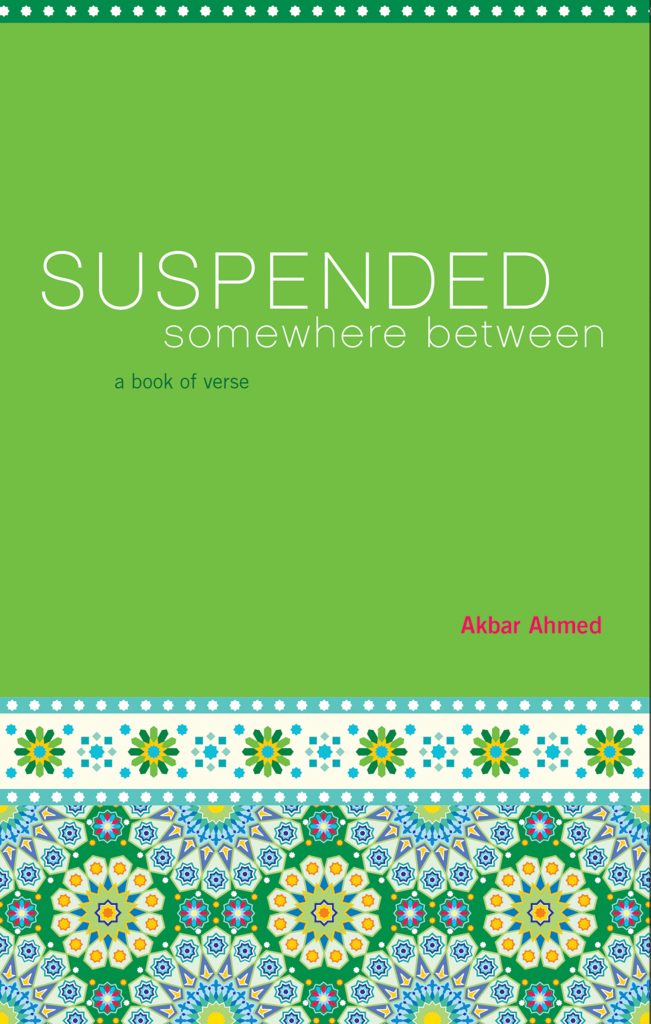By Z.G. Muhammad
Greater Kashmir
August 29th, 2013
A treat for all those who look for sublimity in poetry.
I
have read Ambassador Akbar S Ahmed, ‘world’s foremost anthropologist
and reviewed some of his books including his latest one Journey into
America. Reading his latest collection of poems, “SUSPENDED somewhere between – a book of verse‘
published in 2011 by Busboys and Poets, Washington, it was an amazing
experience to discover the scholar known for “changing the face of
anthropology’ as a poet- with same piquancy as that of Allama:
“Then, one day my head high again, I will rise
pure Muslim, Marxist-Malinonwski-Mawdoodi wise,
one day I will no longer sweat-fear to dream,
then, I will posses the key to alif-lam mim”
Akbar
is a profound and prolific writer as very rightly put by Dan Futterman
in his foreword to the verse collection, “his writings to this day have
been like a sea-rich and full of life and well exploringŠ now with this
collection we get the ocean”. The book of verse contains seventy
smaller poems mostly in blank verses. The collection as very well said
by the poet ‘is ‘call from inside’. The poems written over a period of
fifty years continue to cascade with their freshness. Every verse is an
echo from the depths of heart. Nostalgia permeates in many poems and
‘Diaspora’ is one such example.
“Lal Killa and
Hyderabad, Deccan
Crumble into
those mosaic
tiles of my floral
incubus. The
awakening in the
actuality of parched Sindh.
Karachi the harlot
Of ethnic hungers
sucks me in.”
In
his poem ‘will ever be’ with his bruised psyche he talks about some
ancient Sanskrit curse hanging over him but he believes that he can
brave it and come out of its spell.
“There must seems be
An ancient Sanskrit curse
Over me
But
Yet awhile
That great heart of Umar
Beats in me
And Ali’s hand holds my sword.
Perhaps that day will never be.”
The
poet has divided his anthology into five broad chapters, Pakistan,
Love, Islam, Echoes of history and pense’es. The influences of Rumi,
Iqbal, Ghalibs and English romantic poets on Akbar are quite
discernable. Living in America the poet is pained about the situation in
his own country. In ‘Pukhtun landscape a mood,’ that I see as one of
major poems in the collection the poet laments about the land where he
had served as a young officer. He believes that foreign ferringhee is
not the enemy but enemy is within:
“I don’t hear singing in the fields any more,
I don’t hear the reed by riverside
The sounds of laughter seem to have gone evermore
Even the tears have almost driedŠ
Nothing grows from barrel of gun
Save fever and fire and fear
What for one man is game and fun
For another is injustice without peer.”
In
poem titled I, Saracen, like Iqbal he takes pride in his past, rising a
‘colossus’ from shimmering sands’ and not only conquering the world but
immensely contributing to it but also craves for return of that
glorious past:
“Thundering ‘ism crash about me,
I gasp, I wake, I see
around me fragments of Suez fall
Muhammad Mustapha (SAW) I hear you call”
Notwithstanding disappointments Akbar exudes with optimism and a firm resolve:
“I hear you in muezzin’s calling
I vow again to revive within me your song
to sing it forever, sweet and long”
The
scholar in Akbar like Iqbal very subtly creeps in his poetry. The poem
titled ‘The Passing of an Empire’ to me is his voluminous book ‘Journey
into America’ encapsulated. He sees American politicians speaking about
bringing democracy and civilization to the world as a sick joke to the
occupied people.
“And how will conquered
Recall their masters?
In Asia they remember
The pyramids of skulls
Left by the Mongols
In Europe,
The gas chambers
Of the Nazis.
Will Afghans
Remember anything else
Besides the Abu Gharib?
ŠŠŠŠ..
The anger and ignorance
Around Islam remained dangerously high.
An outstanding presidential candidate,
Bursting with charisma,
Loudly and repeatedly
Was attacked simply
Because his middle name was Hussein”
Akbar’s
voice is not in wilderness. It is not a cry in desperation. Like Iqbal
he challenges those harboring the idea of neo-colonization in twenty
first century.
“History will record
The empire was halted
By the impoverished
But proud
Peoples of two
Muslim nations.
ŠŠŠ.
Future military adventures
And the American’s sheer exhaustion
Combined with failure to see
Its predicament
All the while,
he Russian bear
and Chinese dragon
Watched in glee
Š.and waited.”
The collection is a treat for all those who look for sublimity in poetry.
(Feedback at [email protected])







